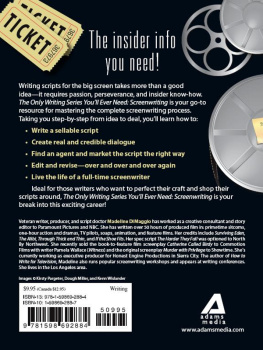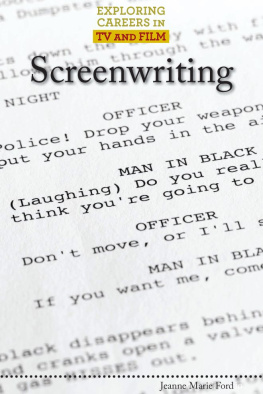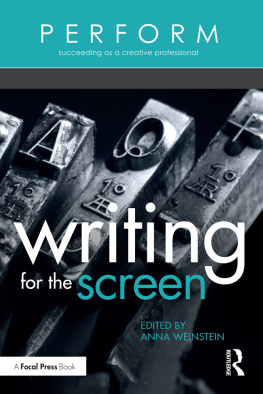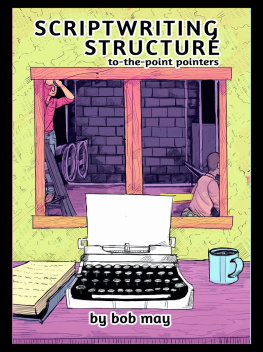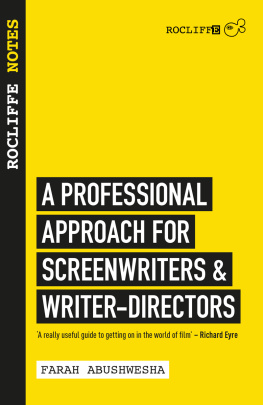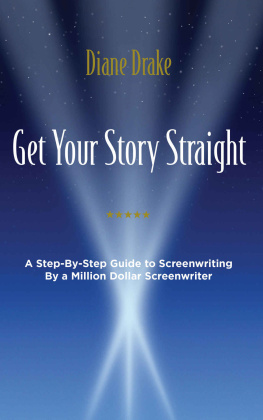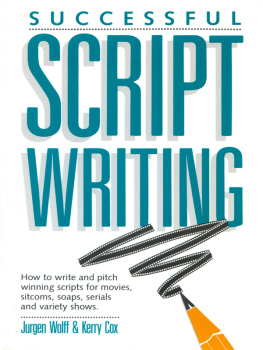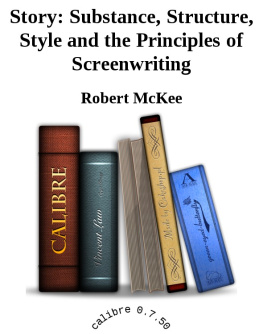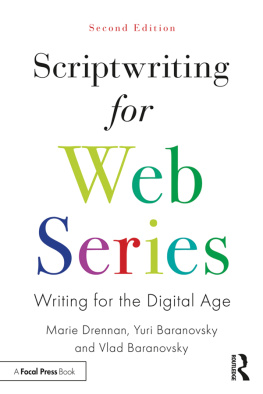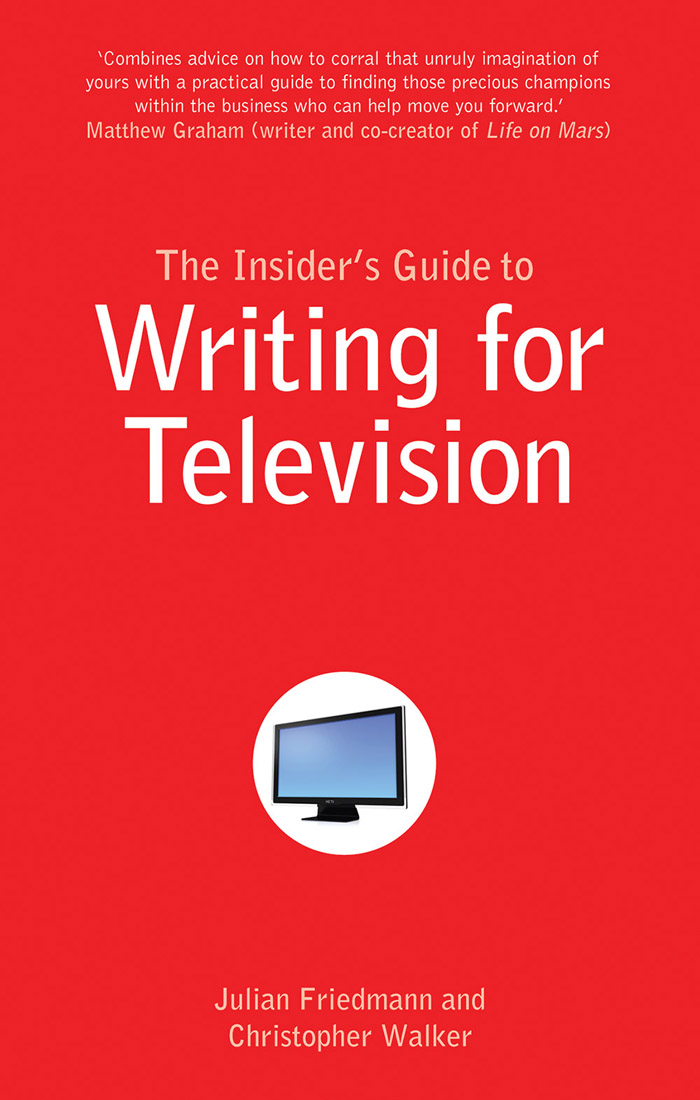The Insiders Guide to
Writing for Television
Julian Friedmann
and
Christopher Walker

Also in this series
The Insiders Guide to Getting Your Book Published
The Insiders Guide to Writing for Television
Julian Friedmann and Christopher Walker
This 1st edition is published in 2012 by Trotman Publishing
Crimson Publishing, Westminster House, Kew Road, Richmond, Surrey TW9 2ND
Julian Friedmann and Christopher Walker 2012
Epub edition 2012 ISBN: 978 1 8445 5561 1
The author has asserted their moral rights to be identified as the the author of this work in accordance with the Copyrights, Designs and Patents Act 1988.
British Library cataloguing in Publication data
A catalogue record for this book is available from the British Library
All rights reserved under International and Pan-American Copyright Conventions. By payment of the required fees, you have been granted the non-exclusive, non-transferable right to access and read the text of this ebook on-screen. No part of this text may be reproduced, transmitted, downloaded, decompiled, reverse engineered, or stored in or introduced into any information storage and retrieval system, in any form or by any means whether electronic or mechanical, now known or hereinafter invented, without the express written permission of Crimson Publishing ebooks.
Epub file created by MPS Ltd, Chennai
Contents
Perhaps you bought this book because you have been thinking about becoming a screenwriter for some time. Maybe you havent had a chance to get anything down on paper or computer screen. Youre undecided about what sort of story to tell. Are you a romantic or a horror-meister? Are you Julian Fellowes or Steven Moffat? Perhaps you feel you need to conduct more research, to find out what the television industry is looking for what genres are trending?
Well Im sorry but already Im suspicious.
Writers may often research their work but they rarely research their desire to work. Writing should be more than an itch one needs to scratch; it should be a way of relating to the world that one simply cannot ignore or avoid. Putting it simply, you should be writing already. Thats where to begin. At the desk. In front of the Mac. Crazy ideas spilling out of your head. Sploshing across the screen like wet paint. Laying it down like Jackson Pollock with nary a care in the world. Being a writer isnt what you do, its who you are.
Its frightening, sending your work into an uncaring world. There is no reason for people to like or connect with your script. There are so many scripts out there how the hell is yours going to stand out? No answer to that, apart from the obvious with talent and a smidgen of amazing luck. But you cannot let that put you off. It all must start with You. What You want to write about. What story matters to You. Some will call that confidence and others will label it hubris. And then if it reaches development or even production you will be bombarded by notes from all sides actors, editors, producers, directors, TV execs all challenging your work, pulling it in different directions. Who do you listen to? When do you concede and when do you stand your ground? Again, there is no easy straight answer. And finally when your baby steps out onto the screen you will hear a cold hard voice bellow release the creatures! And out of the fetid bowels of Hades will crawl The Critics. And God only knows what garlands or thunderbolts they will hurl at your head.
This book is not a panacea for the trials, tribulations and joys of screenwriting. It is a road-map through the terrain. It cannot cross the misty mountains for you but it can tell you where they are to be found and which walking boots to wear for them. It combines advice on how to corral that unruly imagination of yours with a practical guide to finding those precious champions within the business who can help move you forward. What it cannot do what no book can do is turn a non-writer into a writer. Ive sometimes heard people musing, I might get into the writing game. I hear theres money in it. Those people do not succeed. But you sploshers of wet undisciplined paint and you know who you are you are who this book is written for.
Enjoy it. Learn from it. Be inspired by it. And keep on sploshing.
Matthew Graham
January 2012
If you are reading this, you are presumably serious about writing for television. Perhaps you already write for television and want to improve your career or perhaps you write in other media and want to see if television is where you should be focusing your efforts. Or perhaps youre a complete beginner who loves watching television and has a fantastic idea for a new show (or for developing an existing one). If you fall into any of these three categories, this book is for you.
The Insiders Guide to Writing for Television is unlike other writing guides in two important respects. Firstly, it concentrates solely on television scriptwriting, which is quite different from writing for the theatre or the cinema, both in terms of craft and career development. Secondly, it offers expert advice in both those distinct areas: craft and career development. Being a talented writer is not enough. If you want to make a living writing for television you need to be a successful businessperson too and this book will help you master both sets of skills.
The first section of the book, written by Julian Friedmann, is concerned with the business of writing for television, and offers strategies for breaking into the industry and subsequently making a living. It covers everything from research and training to putting together a submission package to negotiating contracts.
The second section, written by Christopher Walker, discusses the art and craft of writing for television audiences, and provides creative advice on producing scripts that will sell in todays crowded, fast-moving marketplace. It covers format and genre as well as how to produce the industrys selling documents, the synopsis, treatment and scene-by-scene breakdown.
No prior knowledge is assumed, but we hope the experienced writer will also find much of value in this book. It is intended to remain a trusted companion throughout your writing life, taken down from the shelf and consulted again each time your career takes another exciting step forward.
How writing for TV compares with writing for other media, and why you need to be a businessperson as well as a writer
The business of writing for television
Writers are usually freelancers, with all the connotations of irregular income and eking out a livelihood. Many writers are driven by a desire to tell stories. They do not see writing primarily in terms of bringing in money but rather as something they have to do. For some, storytelling in whatever format is almost a compulsion.
Most writers, whether experienced, compulsive or beginners, do not see themselves as running a business and, as a result, do not behave in a businesslike way. They allow themselves to be disadvantaged, with the result that they earn below the minimum wage. They put themselves into that position and cannot blame producers some of whom are equally impoverished for exploiting them.


